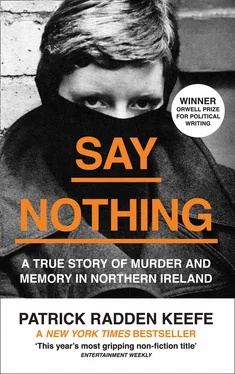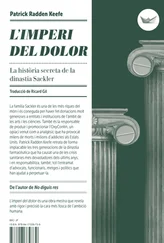The interrogators beat Adams, but he wouldn’t say a word. They tried good cop, bad cop – one of them going completely berserk, pulling out his gun and threatening to shoot Adams, only to be restrained by the other – but Adams didn’t break. It was only when he sensed that the interrogation was finally coming to an end that he acknowledged what everybody already knew: that he was Gerry Adams. By that time, his interrogators had been arguing with him for so long over the simple question of what his name was that Adams had managed to tell them nothing of any substance. ‘Of course, my strategy had been reduced to a charade by this time, but it had given me, I felt, a crutch to withstand their inquisition,’ he later observed. ‘To remain silent was the best policy. So even though they knew who I was, it was irrelevant. I couldn’t answer their questions, on the basis that I wasn’t who they said I was.’
When he was hauled onto the Maidstone , Adams saw the prison doctor and explained that, after all the beating, his ribs felt tender.
‘Is it sore?’ the doctor asked.
‘It’s sore when I breathe,’ Adams replied.
‘Stop breathing,’ the doctor said, without a flicker of a smile.
If the staff on board the Maidstone seemed bitter, and security was particularly tight, there was a reason. One frigid January evening a couple of months earlier, seven republican prisoners had stripped to their underwear, slathered their bodies in butter and black boot polish to insulate against the cold, sawed through an iron bar, squeezed through a porthole, dropped one by one into the icy water of the Musgrave Channel, and swum several hundred yards to the opposite shore. They had come up with the idea for the escape after watching a seal navigate the barbed-wire netting that had been placed in the water around the ship.
All seven men made it to the far shore and scrambled out of the water. They were soaking wet, dressed in their underwear and smeared with shoe polish. Looking as if they had just crawled out of the Black Lagoon, they proceeded to hijack a bus. Fortuitously, one of the escapees had been a bus driver before joining the IRA, and he piloted this unlikely getaway vehicle into central Belfast. When they stopped in a neighbourhood that was home to many republican sympathisers, local kids immediately set upon the bus, like a swarm of locusts, and started stripping it for parts. The prisoners hastened into the nearest pub, still mostly naked, and the patrons who stood around the bar looked up abruptly, shocked by this sudden, surreal intrusion. Then, without hesitation or, really, much need for explanation, the regulars started stripping off their own clothes and offering them to the fugitives. One of the patrons produced his car keys and tossed them to the men, saying, ‘Away youse go.’ By the time the army mobilised six hundred troops for a manhunt, the men had vanished. After slipping across the border, they held a triumphant press conference in Dublin, where the newspapers anointed them ‘the Magnificent Seven’.
Not long after Adams arrived on the Maidstone , British authorities elected to close the ship. The new prison that had been under construction for some time at the airfield outside Belfast was now complete. It was known as Long Kesh. One day, Adams was handcuffed to another prisoner, loaded into an army helicopter and flown to the new facility. Long Kesh was an eerie place. The paramilitaries who were confined there, adamant that they were not criminals but political prisoners, called it a concentration camp. And it looked like a concentration camp: on a windswept, desolate plain, a series of corrugated steel huts housed the prisoners, amid barbed-wire fences, floodlights and sentry towers.
Long Kesh came to occupy a vivid place in the Irish republican imagination. But Adams would not be staying long. One day in June 1972, a couple of months after his arrival, someone shouted, ‘Adams – release!’ At first he thought this must be a practical joke. Or, worse, a trap. But when he had gathered his belongings and stepped out of the prison, he saw Dolours and Marian Price waiting there for him, with a car to take him home. They drove him into Andersonstown, for a meeting with other members of the republican leadership on a matter of utmost delicacy.
While Adams was locked up, a secret back channel had been developing between the Provos and the British government. After some preliminary contacts, it seemed that an opportunity might exist to negotiate a possible ceasefire. One of Adams’s confederates in the IRA, a hard man named Ivor Bell, had insisted that a necessary precondition for any discussions with the British was the release from internment of Gerry Adams. He was still only twenty-three years old, but Adams had become such an instrumental figure in the IRA that there could be no peace talks without him. ‘No fucking ceasefire unless Gerry is released,’ Bell said.
On 26 June, the IRA initiated a ceasefire, and the British Army agreed to reciprocate. There had been an increase in the number of bombings and shootings just prior to the ceasefire; some suggested that this may have been a deliberate IRA strategy, in order to underline the contrast when the shooting stopped. But once the truce was called, IRA leaders committed to honouring it, vowing, in an unintentionally comical flourish, that anyone who violated the ceasefire would be shot. The Provos announced that they had formulated a ‘peace plan’, which they would reveal ‘at the appropriate time’.
Many people in Northern Ireland objected on principle to any such dialogue, insisting that there should be no negotiation whatsoever with IRA terrorists. But that July, Adams and a small contingent of fellow IRA members boarded a British military plane, under conditions of great secrecy. Along with Adams, the group included Seán Mac Stíofáin, Ivor Bell, a gregarious, curly-haired young man named Martin McGuinness, who was the OC in Derry, and two other IRA leaders, Dáithí Ó Conaill and Seamus Twomey. They landed at an air force base in Oxfordshire, where two immense limousines stood waiting.
If this mode of conveyance seemed ostentatiously swanky, it was also grounds for suspicion. Adams was a former bartender. Ivor Bell had worked as a mechanic. McGuinness had trained as a butcher’s assistant. Hyper-attuned to any hint of British pomposity, the rebels would not allow themselves to be patronised or cowed. In advance of the trip, Bell had announced that, while they might be an official delegation to a peace summit, he, for one, would not be putting on a suit and tie. If history had taught him anything, Bell said, it was that the British liked nothing more than to make the Irish feel ill at ease. If their hosts were conspicuously formal, he would answer with extravagant informality. Let them feel uncomfortable for a change. Gerry Adams took a similar view on the wardrobe issue: he selected a pullover with a hole in it for the occasion.
The limousines ferried the group into London and deposited them at a grand old house in Chelsea, facing the Thames. As they walked inside, a little awed despite themselves, Adams noticed a blue plaque on the front wall that said the painter James McNeill Whistler had once lived there.
The Irishmen were escorted up a staircase and into a book-lined drawing room. Then William Whitelaw, Her Majesty’s secretary of state for Northern Ireland, walked in and offered the men a genial greeting. Whitelaw was smooth and polished. He made a show of pronouncing Seán Mac Stíofáin’s adopted name correctly – a touch that Mac Stíofáin could not help but appreciate. But as they shook hands, Adams noticed that Whitelaw’s palms were sweating.
Whitelaw began by saying that, in light of the long history between England and Ireland, he could understand why his guests might regard the British with suspicion, but that he hoped that ‘in me, you will see a British minister you can trust’. That was the high point of the meeting. Mac Stíofáin had prepared a statement, which he proceeded to read out loud. It consisted of a list of demands: the Provos wanted a public declaration from the British government acknowledging the right of all Irish people – in the North and the South – to self-determination. They also wanted the British to declare their intent to withdraw all forces from Irish soil by 1 January 1975.
Читать дальше












![Helen Rowland - The Widow [To Say Nothing of the Man]](/books/752764/helen-rowland-the-widow-to-say-nothing-of-the-man-thumb.webp)